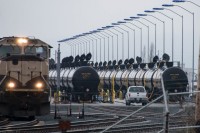After legal challenge, Port of Vancouver reconsiders Tesoro Savage lease for controversial oil terminal; reschedules vote.
The Port of Vancouver will reconsider a controversial lease agreement with Tesoro Savage for an unprecedented oil-by-rail terminal on the Columbia River. The Port held a secret and illegal “executive session” to discuss the lease outside of the public view. The Port’s decision to reconsider the lease acknowledges that its secret meeting was improper. Three public interest groups challenged the Port under the Washington Open Public Meetings Act.
Port will meet to reconsider lease on Tuesday, October 22. Click here for more information on their meeting.
“Shipping huge volumes of oil by rail and then supertankers on the Columbia River is risky to our communities,” stated Marla Nelson, Legal Fellow with the Northwest Environmental Defense Center. “The Port’s attempt to keep this secret is disturbing.”
Under the lease, Tesoro Savage proposes to build a new marine terminal at the Port of Vancouver to receive up to 380,000 barrels of oil or other “petroleum products” every day by trains, and then ship the oil in supertankers down the Columbia River.
“We’re pleased that the Port will reconsider the controversial lease in response to our lawsuit,” stated Devorah Ancel with the Sierra Club. “Now the Port must tell the public what they discussed in their secret meeting and hold a real public process. Simply rushing another vote is inappropriate.”
“An Exxon-Valdez type spill from a supertanker or oil train would devastate the Columbia River,” stated Brett VandenHeuvel, Executive Director for Columbia Riverkeeper. “Our region deserves a vigorous debate about whether we want dirty oil.”
Three public interest groups, Columbia Riverkeeper, Sierra Club, and Northwest Environmental Defense Center, brought a lawsuit on October 2, 2013. The complaint alleges that the Port violated the Washington Open Public Meetings Act by: 1) deliberating on the lease outside of public meetings, and 2) using a secret “Executive Session” for improper purposes.
On July 23, 2013, the Port approved a lease that allows shipment of any “petroleum product.” Rail cars could carry the same Bakken crude that exploded in Quebec or tar sands from Canada, passing through the Columbia River Gorge and rolling within several blocks of downtown Vancouver and hundreds of residences. The scale of oil transport is unprecedented: 380,000 barrels per day by rail is 45% of the capacity of the controversial Keystone XL Pipeline.
Dozens of Vancouver citizens testified against the lease, raising concerns about public health, oil spills, oil trains clogging traffic, reduced property value along the rail route, and the climate change impacts of exporting more oil.
Due to the enormous scale of the oil terminal proposal, state law requires Governor Inslee to make the final permitting decision, after the Washington Energy Facility Site Evaluation Council (EFSEC) reviews the application. There is an EFSEC scoping hearing on October 29, 2013, which could be canceled now that the Port is reconsidering the lease.
The complaint is available here.



